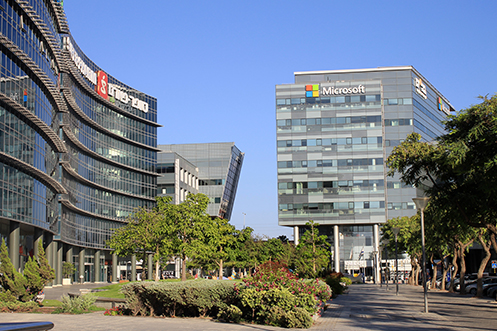The Israel hi-tech sector has been growing in size and as a percentage of the nation’s economy. For the first time in the nation’s history, employment in this industry now exceeds 300,000 workers, representing 8.7% of the country’s workforce. Job growth continues to be strong, with surging demand for talent outpacing the supply of qualified workers.
What Companies Lead the Israel Hi-Tech Sector?
The Israel hi-tech sector is known as “Silicon Wadi” and is filled with a large number of multinational companies. Many of these companies have established research and development centers in and near the city of Tel Aviv. These companies have helped to propel Israel to become the tech hub of the Middle East. The nation receives a significant share of venture capital investment.
Large multinational companies that lead the Israel hi-tech sector include:
In addition to these large companies, this sector has many other employers. In Israel, hi-tech includes many mature mid-size companies as well as young start-up enterprises.
What Jobs are Companies in the Israel Hi-Tech Sector Seeking to Fill?
The Israel Innovation Authority and Start-Up National Central published a joint study noting that the Israel hi-tech sector is growing faster than the supply of workers in the country. As a result, the nation is facing a shortage of about 15,000 skilled workers just to fill open positions.
Jobs that the industry is seeking to fill include:
- Artificial Intelligence Developers
- Data Scientists
- Engineers
- Machine Learning Engineers
- Programmers
- Scientists
- DevOps Software Engineers
- Front-End Web Developers
- Back-End Web Developers
Focus on Artificial Intelligence Start-Ups
Artificial intelligence is a branch of computer science that focuses on creating “smart machines” that can do tasks that humans usually perform. Artificial intelligence start-ups in the Israel hi-tech sector account for a significant portion of the industry’s employment growth. Several of these companies have received venture capital funding to continue their growth and development. Applications cover a wide range of processes in medical, industrial, and business settings.
The top 3 artificial intelligence start-ups in Israel as measured by their level of funding are:
Airobotics: automated industrial drones for gathering aerial data and developing insights
OrCam: artificial vision in an intuitive portable device
Cortica: simulation of the mammal cortex (largest component of the brain) for use in autonomous vehicles, drones, robotics
What Should Job Seekers do About the Israel Hi-Tech Sector?
Job seekers should investigate the Israel hi-tech sector for opportunities. A number of resources are available to learn about jobs in this sector. Professional networks such as Linkedin often have helpful information on companies and contacts, as does the Israel Job Board and the Jewish Agency for Israel. Job seekers may want to focus on a specific location such as Tel Aviv or Haifa and then identify specific employers to target their job preferences.
Job seekers in the Israel hi-tech sector should utilize professional career services to enhance their job search and achieve success in their career objectives.
What Should Employers in the Israel Hi-Tech Sector do?
Employers in Israel should review their employment needs and corporate growth objectives. This will help define their need for employees with requisite skills and training. They should review their relocation program to determine if it benefits their talent acquisition goals and corporate objectives. Employers should work with a Relocation Management Company that has the knowledge and expertise to help them design a relocation program that promotes talent acquisition.
GMS has recently published several Industry Benchmarking Studies that will help employers in the Israel hi-tech sector learn whether their company’s relocation program is designed following industry-specific best practices. There are many benefits to a corporate relocation policy benchmarking. For example, employers can learn how they can ensure their competitiveness in their industry to attract and retain talent with the highest level of skills and experience.
Industry best practice is to schedule a relocation program and policy review every 12 to 18 months to ensure your company maintains its competitive position. This review will help your company learn about how the relocation industry is evolving to meet the needs of the Israel hi-tech sector. It will also reveal increasing employee demands as they relate to their relocation process.
Conclusion
GMS’ team of global relocation experts has helped thousands of our clients develop hiring and recruiting programs to attract highly skilled job seekers. Our team can help your company determine how to attract job seekers looking for employment opportunities in the Israel hi-tech sector.
GMS was the first relocation company to register as a .com. The company also created the first online interactive tools and calculators, and revolutionized the entire relocation industry. GMS continues to set the industry pace as the pioneer in innovation and technology solutions with its proprietary MyRelocation® technology platform.
Global Mobility Solutions is proud to be named and ranked #1 Overall, and #1 in Quality of Service by HRO Today’s 2019 Baker’s Dozen Customer Satisfaction Survey.
Contact our experts online to discuss how we can help your company’s talent acquisition program in the Israel hi-tech sector, or give us a call at 800.617.1904 or 480.922.0700 today.












